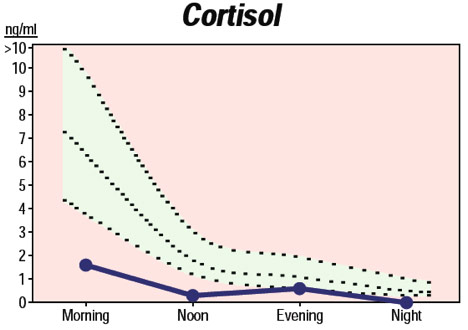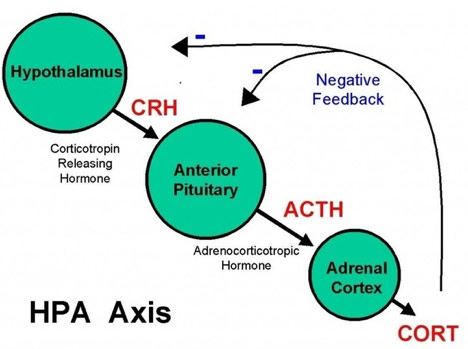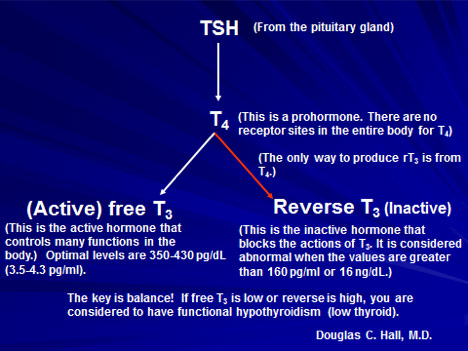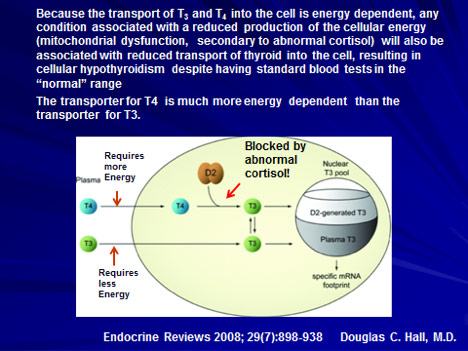Cortisol is a steroid hormone produced by the adrenal glands, which sit on top of each kidney. It is often referred to as the “Fight or Flight” hormone. When released into the bloodstream, cortisol can act on many different parts of your body; it can help you respond to stress or danger, increase your metabolism of glucose, and control your blood pressure.
Normally, cortisol is the highest in the morning and decreases throughout the day, being lowest at bedtime to permit sleep. Look at the diagram below.

The most accurate means of determining cortisol levels is by salivary testing. Salivary samples should be obtained on a typical day when you are experiencing your typical daily stressors. The first sample is collected upon arising, second sample at noon, third sample at 4 p.m. and the last sample at bedtime. The samples are mailed to the lab the following morning. The total amount of cortisol produced per day (adding up the samples) is referred to as the cortisol load, which is controlled by a part of the brain called the hypothalamus. The rhythm of the graph is controlled by the part of the brain called the hippocampus. The test can show if the cortisol load is abnormal, the rhythm is abnormal, or they are both abnormal. This allows the functional medicine healthcare provider to direct his/her attention to determine the root cause of the problem.
Look at the diagram below.

The signal begins in the hypothalamus, where corticotropin releasing hormone (CRH) is produced and stimulates the pituitary gland to produce adrenocorticotropic hormone (ACTH), which tells the adrenal glands to produce cortisol. When adequate amount of cortisol is produced, it signals the anterior pituitary and hypothalamus to stop sending signals to produce more cortisol.
What is the normal function of cortisol in the body? This steroid hormone:
- Affects bone turnover rate
- Affects immune system response
- Affects pituitary/thyroid/adrenal systems
- Affects stress reactions
- Balances blood sugar
- Helps you sleep
- Improves mood and thoughts
- Influences DHEA/insulin ratio
- Influences estrogen/testosterone ratio
- Is anti-inflammatory
- Participates with aldosterone in sodium reabsorption
Virtually all organ systems are involved in cortisol metabolism.
The three main stimuli for cortisol production are abnormal glucose, inflammation and stress. That stress may be emotional, physical or chemical. Again, a four-point salivary cortisol test is essential in any evaluation.
What are typical symptoms of abnormal cortisol values?
- Alcoholism
- Allergies (environmental sensitivities and chemical intolerance)
- Decreased immunity
- Decreased sexual interest
- Digestive problems
- Drug addiction
- Emotional imbalances
- Emotional paralysis
- Fatigue
- Feelings of being overwhelmed
- General feeling of “unwellness”
- Hypoglycemia (low blood sugar)
- Increased PMS, perimenopausal and menopausal symptoms
- Lack of stamina
- Loss of motivation or initiative
- Low blood pressure
- Poor healing of wounds
- Progressive poorer athletic performance
- Sensitivity to light
- Unresponsive hypothyroidism (low thyroid function that doesn’t respond to treatment)
Here is just one example of the multiple ways elevated cortisol impairs the thyroid:

In a normal thyroid, thyroid stimulating hormone (TSH) stimulates the gland to make prohormone T4, which converts to T3, the active hormone. But look what happens when excess cortisol is present — the individual develops multiple symptoms of low thyroid! The treatment is not to increase the dose of thyroid medication, but determine the root cause of the abnormal cortisol and treat it appropriately.
Abnormal cortisol has additional adverse effects on thyroid metabolism, as shown in this diagram:

Hormones do not passively pass through the cell membrane; they require energy to be transported into cells. More energy is required for T4 than T3. Once T4 enters the cell, the conversion to the active hormone T3 is impaired by cortisol! Normal cortisol is also required to transport T3 from the membrane to the nucleus of the cell to activate the gene! Gene activation also requires normal cortisol. It is virtually impossible to manage thyroid hormones without knowing cortisol metabolism!
Listed below are numerous conditions related to abnormal cortisol metabolism:
- Insulin resistance
- Obesity
- Hypertension
- Type2 diabetes
- Polycystic ovary disease syndrome
- Atherosclerosis
- Cardiovascular complications
- Dyslipidemia (abnormal cholesterol values)
- Sleep disturbances
- Anxiety/depression
Abnormal cortisol also disrupts circadian rhythm, which is a risk factor for breast and colorectal cancer.
There are numerous possibilities regarding the results of the four-point salivary cortisol test. The values can be high or low at any time during the day or evening, or all the values can be high or low. Medical Detective has several cortisol supplements available that have been developed to assist in correcting various cortisol abnormalities. The key is to determine the cause. In the meantime, the appropriate nutritional supplement will support the recovery of the adrenal gland and return the cortisol levels to normal.


